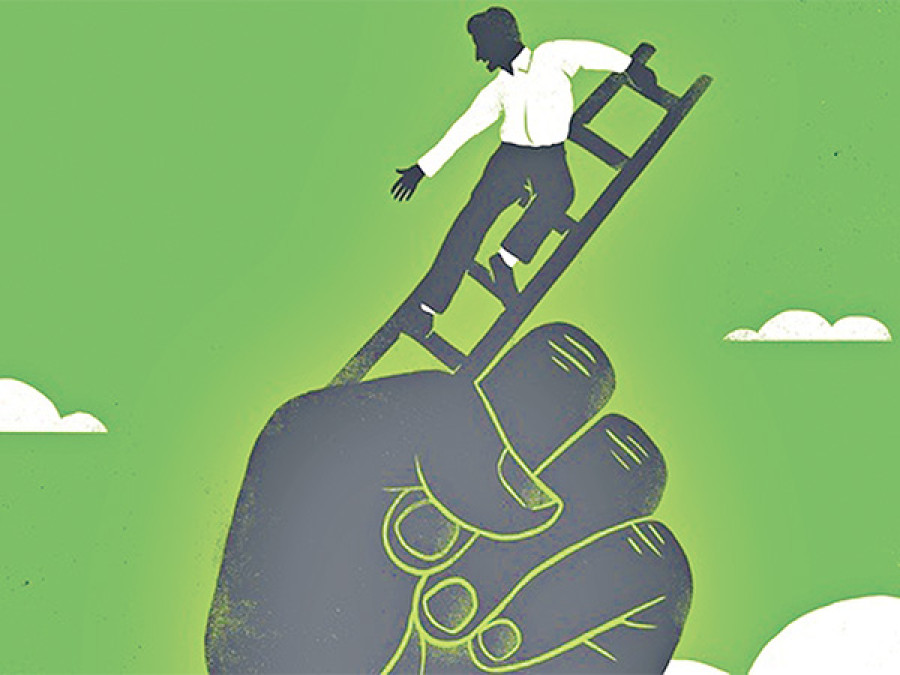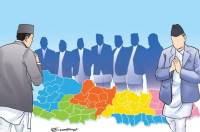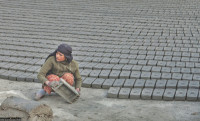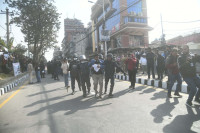Opinion
Building bridges
Political parties can still redeem their image by participating in reconstruction and rehabilitation efforts
Khagendra N. Sharma
In a democratic system, alienating themselves from the people can prove costly for political parties. After the restoration of democracy in 1990, for example, it has been seen that whenever a political party has moved away from the people, it has been voted against by the public in the subsequent election. This happens because these parties are leader-driven rather than people-driven. Parties profess to represent the people, but their leaders forget the aspirations of the public after winning an election. As a result, they get rejected in the next election.
Losing support
The election for the second Constituent Assembly (CA) can be taken as an example of this hypothesis. The first CA election was the demonstration of the public’s rejection of the old, major parties, like the Nepali Congress and the CPN-UML. It led to the emergence of three new forces in Nepali politics, the Maoists, Madhesi parties and, to some extent, ethnic parties from the hills. But throughout the period between the first CA and the preparatory phase of the second CA, these new forces did not act according to the people’s wishes. To make the matters worse, the Maoists and the Madhesis broke down into several splinter groups, thus losing their weight in the eyes of the people. Similarly, ethnic parties too could not meet the public expectation. So by the time the 2013 election was declared, their popular support had dwindled to such an extent that the Maoists, which was at the top in the first CA, was reduced to distant third after the second CA election, and the Madhesi parties were downgraded from their fourth position in the first CA to fifth in the second.
However, they have still failed to acknowledge the judgment of the people. Their role in the second CA has remained broadly negative. As a result, they have been further aliened from the masses. If a fresh election were to be held, their positions would go down further.
Lost opportunity
In the given scenario, the recent earthquake provided a fresh opportunity for these parties, particularly the opposition, to connect to the people. The government handled the immediate rescue operations because it had the required manpower, in the form of security forces, and other necessary resources. With international assistance, our security forces carried out rescue operations with relative success. In the absence of local political bodies—which, had it existed, could have played an important role post-quake, especially in assessing the damage done, identifying the needs of the affected populace and in distributing relief supplies to the needy—political parties could have gone to assuage the affected people with material and emotional support.
Since this earthquake hit 14 districts in the Central region but left the other hilly districts relatively unharmed, party organisations operating in the less-affected districts could have sent help to the most-affected areas and cooperated in facilitating the equitable distribution of relief supplies. Similarly, Madhesi parties could have used this opportunity to help the Pahadi people in distress. This would have helped build a rapport between the people from the hills and the plains. But they again missed this opportunity to win the respect of the people. They were not happy with the way the government handled the problem. But merely expressing their resentment towards the government is not enough in times of crisis.
Open window
Now that the third phase, involving the construction of temporary shelters in the affected areas, is in full swing, political parties can still come forward and discuss ways to help the homeless. The government has announced financial support for constructing temporary shelters, but this is not enough. Given that the monsoon is just days away, and permanent shelters must be constructed as soon as possible, parties can involve more cadres in supervising and constructing homes for the homeless than they are doing now. Also, they can use their grassroots organisations to raise awareness about and effectively implement the building code in their respective areas. Wrong construction practices, perpetuated by the lack of knowledge about building resilient structures, were largely responsible for the devastation in the rural areas.
And it does not end there. Political parties still have more ways to gain respect in the eyes of the people. They can still push for the creation of multiparty planning and action committees at different levels to oversee disaster management. If they did so, the government would be forced to provide them with necessary support.
Such a step would provide them with a unique opportunity to be creatively associated with the people. Despite making many mistakes, political parties still have ways to build bridges with the people.
Demanding for the formation of a national government in difficult times like these will further tarnish the image of the parties which have already lost the trust of the people.
Sharma is a freelance political analyst ([email protected])




 9.12°C Kathmandu
9.12°C Kathmandu










